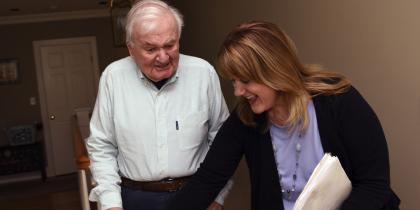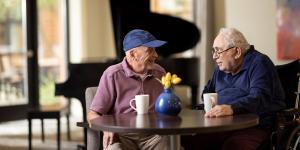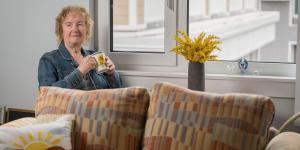12 Tips to Prevent Falls at Home
These simple tips teach you how to make your home safer and prevent falls.

Falls are dangerous for people of all ages. However, as we get older, even simple falls can have big consequences — from serious injuries to hospitalization. In fact, the CDC reports that falls are the leading cause of injury in older adults. The good news is that falls aren’t inevitable, and the right environment and support can help prevent them.
Janice Conway, PT, MHS, a physical therapist for Hebrew SeniorLife Home Health, explains that falling isn’t often caused by just one thing — many factors can play a role. “I always tell my patients that when you think about what you can do for yourself to prevent falls, you need to think about different systems: your vision, your hearing, your range of motion, your strength, your cognition, and your environment,” she explains.
With that in mind, here are Conway’s top tips to prevent falls at home:
- Examine rugs and clear pathways.
Rugs, especially small throw rugs, are a tripping hazard. Any rug can easily get caught in a person’s walker, and if you don’t use a walker, a rug can act as an easy tripping mechanism. If you’re attached to a beautiful area rug, try securing the edges to prevent tripping. Moving other furniture to allow wide, clear pathways can also help prevent falls.
- Improve lighting.
To prevent falls when you wake up, use bright lighting or motion-sensing lights in hallways and bathrooms.
- Keep things within reach in the kitchen.
Keep routinely used items within reach in the kitchen. Avoid step stools, which are a common cause of falls. If possible, place items at counter height.
- Consider proper bed height.
Your feet should be flat when you sit on the bed to avoid falls when getting in and out. If your mattress is too high, consider a low-profile box spring.
- Wear appropriate footwear.
Wear closed-toe and closed-back shoes with supportive soles that fit you properly. If you wear slippers, make sure they have a nonskid sole. Avoid wearing just socks, as they do not provide traction.
- Add adaptive equipment.
Install grab bars, a shower chair, railings on the stairs, a raised toilet seat, or a chair lift. Use a cane or walker if you need one, and consider a personal emergency response system for additional peace of mind.
- Stay hydrated and eat well.
Staying hydrated and eating regular meals are important to prevent dizziness or a drop in blood pressure, which can cause a fall when you change position.
- Exercise.
Keep moving. Whatever movement you can do, even simple walking or chair exercises, may help prevent falls.
- Consider a physical therapy program.
Physical therapy programs can help you gain confidence in your strength and mobility, even before a fall occurs.
- Review your medications.
Certain medications can make you feel dizzy or light-headed, increasing your risk of falling. Taking multiple medications at once can also cause interactions or intensify these effects. It’s a good idea to monitor and understand these possible side effects, as they may affect your balance.
- Schedule your annual vision and hearing exams.
Changes in your eyesight or hearing can contribute to a fall, so have them both checked regularly.
- Ask your physician about bone and cognitive screenings.
These tests can flag underlying issues like osteoporosis or memory changes that may affect your fall risk.
In-home health care for older adults in Greater Boston
Hebrew SeniorLife Home Health professionals are trained to evaluate each client’s risk for falls and suggest modifications to increase safety at home. Let us help get you back on the path to wellness!
If you or your loved one needs home care after an illness, hospitalization, or injury, learn more about our services today.
Blog Topics
Learn More
Home Health
Hebrew SeniorLife Home Health will send registered nurses and home health aides to your home to provide skilled care any time you need it.



